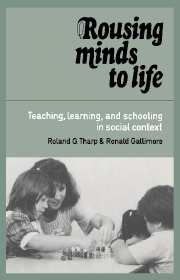Introduction
Published online by Cambridge University Press: 05 June 2012
Summary
The problem of teaching: its contemporary context in historical perspective
Once again, America has become concerned with its schools. It is only the most recent of the irregular series of national spasms that, from time to time, grip the nation. No less than nine recent national commissions and reports have offered a painful picture of American education (Griesemer & Butler, 1983). The torrent of comment, proposal, dispute, and accusation generated by these reports has become a contemporary version of the “great school debate” (Gross & Gross, 1985).
The last previous round of concern was generated some 30 years ago by the highly publicized Soviet Sputnik success and its rousing of the American competitive spirit (Sarason, 1983). The continuity of issues is revealed in the echoes of the Sputnik crisis that can be heard in the current debate, as in A Nation at Risk (National Commission on Excellence in Education, 1983).
In A Nation at Risk, and other reports of the same ilk, two themes are common. The first is the theme of standards. In one form or another, all conclude that students must be held to a higher standard, including more homework, better comportment, longer school hours, higher expectations, and a solid academic curriculum.
The second theme is the quality of teaching, which the reports hold to be generally poor. A recognition that teaching must be improved has been, sooner or later, the conclusion of all educational reformers, including the most recent wave (Sarason, 1971, 1983; Warren, 1985).
- Type
- Chapter
- Information
- Rousing Minds to LifeTeaching, Learning, and Schooling in Social Context, pp. 1 - 10Publisher: Cambridge University PressPrint publication year: 1989
- 1
- Cited by



